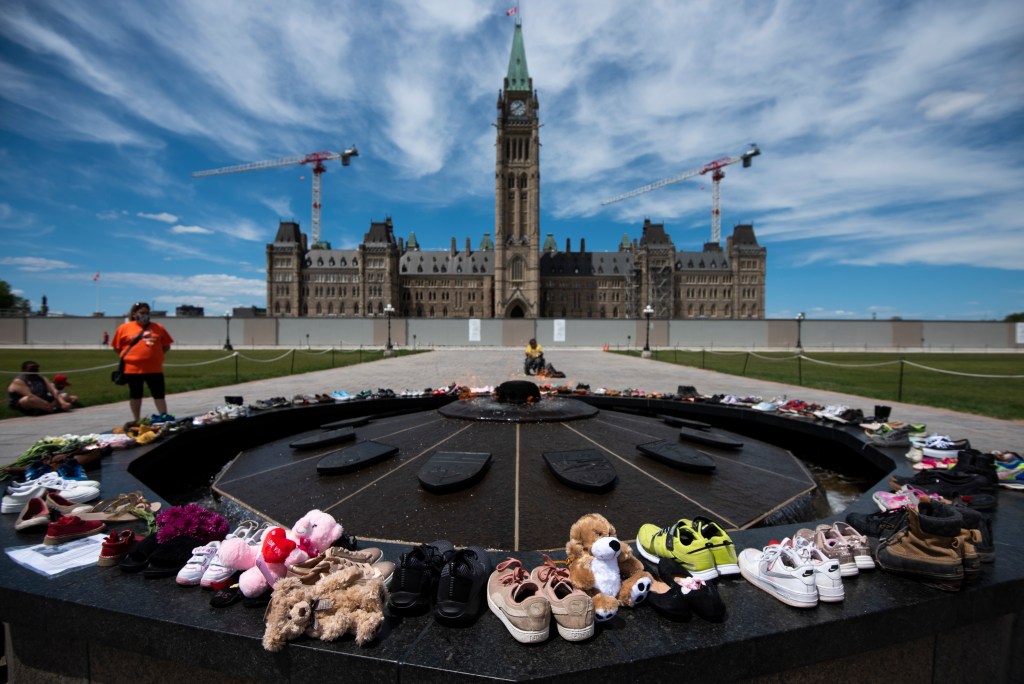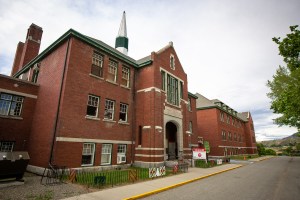Canada and the Catholic Church have failed to reckon with their legacy of residential schools, experts say, after a First Nation found the remains of 215 children buried under a former residential school.
Tk’emlúps te Secwépemc First Nation issued a statement on Thursday confirming that the undocumented remains of the children, some as young as 3, were found under the former Catholic-run Kamloops Indian Residential School, one of the largest of its kind in Canada. Up to 500 students were enrolled at the school, which ran from 1890 to 1978, at any given time.
Videos by VICE
“It’s important we reflect on why it takes a scientific study to demonstrate this when communities have been saying it for years. We shouldn’t need that scientific ‘evidence’ when communities have that evidence in their stories and their families,” said Kisha Supernant, who is Métis, a descendant of the Papaschase First Nation, and the director of the Institute of Prairie and Indigenous Archaeology at the University of Alberta.
Residential schools, run by Catholics, Anglicans, and others, were used by the Canadian government to forcibly assimilate an estimated 150,000 First Nations, Inuit, and Métis children. It amounted to genocide, something Prime Minister Justin Trudeau’s government has acknowledged. Findings published by the Truth and Reconciliation Commission (TRC) five years ago detailed how students were systematically stripped away from their families and communities and forced to attend residential schools, where they were often punished for speaking their Indigenous languages or expressing their identities.
The Canadian government flew flags at half mast at all federal buildings on Sunday to honour the 215 children found, but a lot more needs to be done. According to the Yellowhead Institute, an Indigenous-led think tank, only eight of 94 TRC’s calls to action have been implemented. Five of the calls urge the government to help communities investigate and document children who died or went missing while attending residential school, but so far only one has been implemented: federal support for a national registry of children who died in residential schools.
In 2009, the Conservative federal government denied a TRC request for $1.5 million to locate former students who died or went missing while attending a residential school.
In a Twitter thread, Minister of Crown-Indigenous Relations Carolyn Bennett said $33.8 million was invested in 2019 to support the National Centre for Truth and Reconciliation and her team is engaging with Indigenous communities to figure out how to best implement the calls to action.
On Monday, Trudeau also promised “concrete action.”
“We are looking for how we can support Indigenous communities in their grief and in their request for answers,” Trudeau said.
Meanwhile, the Catholic Church has never apologized to the survivors of residential schools, despite pleas from Trudeau for the Church to do so. (The Anglican, Presbyterian, and United churches apologized in the 90s.) In a brief statement issued Monday, the Canadian Conference of Catholic Bishops said it expressed their “deepest sorrow for the heartrending loss,” and called the discovery “shocking,” but didn’t acknowledge the Church’s complicity. Neither the Canadian Conference of Catholic Bishops, nor the Holy See Mission, which represents the Vatican at the United Nations, responded to VICE World News requests for comment.
“I’m not even sure an apology from the Catholic Church would make a difference at this point except for acknowledging the wrongdoing and genocidal acts that did take place,” said Angela White, the executive director of Indian Residential School Survivor Society and member of Snuneymuxw First Nation.
Executive director of the First Nations Child and Family Caring Society, Cindy Blackstock, told CTV it’s time for the Church to “really accept full responsibility for reparations to families.”
The room for accountability is “endless,” White said, adding that those behind residential schools—governments, churches—need to provide adequate funding and support to Indigenous communities, so that communities and groups like hers can address systemic racism and colonialism, and help their members heal from it.
According to Supernant, all efforts moving forward have to centre Indigenous communities.
“Everything that is done around any school has to be driven by the community or communities involved…But they must be resourced to do it, if they’re ready to do it,” Supernant said, adding that exhuming children, IDing them, and investigating causes of death are more difficult than preliminary surveys that locate remains underground.
“We need to be cautious in not assuming all nations will want that to happen, because that is so incredibly painful,” Supernant said.
Similar unmarked graves at former residential schools are believed to exist since schools didn’t keep clear records, and several First Nations have already committed to leading their own investigations. So far, more than 4,100 children who died while attending residential school have been identified as part of the Truth and Reconciliation Commission’s Missing Children Project, which documents the burial sites of children who died while at residential school.
“Canada has immense amount of work in the area of reconciliation, and addressing the horrific history that resulted (in) thousands of children not making it home. We will not allow them to cover this horrendous history from the world,” said the Federation of Sovereign Indigenous Nations, which represents 74 First Nations in Saskatchewan. The federation has committed to investigate residential school sites in the province and is already in the process of securing the technology that will allow it to do so.
Equally important, is referring to the deliberate and systemic atrocities committed against Indigenous communities as genocide—something many people refuse to do.
“Can we truly have positive changes and open conversations around (how to move forward) if we can’t even acknowledge what was done?” White said.
“One thing I can say is now that you know, don’t sit in silence—Make corrections when you hear misinformation, contact your local MPs, and demand that social justice be implemented.”
Follow Anya Zoledziowski on Twitter.
Anyone experiencing distress or pain as a result of residential schools can call the Indian Residential School Survivors Society Crisis Line (1-866-925-4419). It’s available 24/7. More resources available here.





